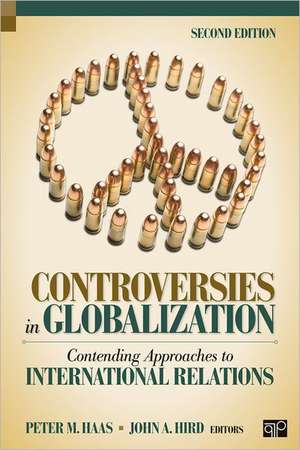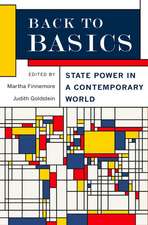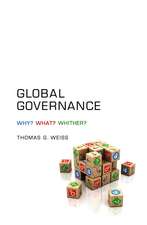Controversies in Globalization: Contending Approaches to International Relations
Editat de Peter M. Haas, John A. Hirden Limba Engleză Paperback – 23 ian 2013
Preț: 568.10 lei
Preț vechi: 624.29 lei
-9% Nou
Puncte Express: 852
Preț estimativ în valută:
108.70€ • 113.50$ • 89.97£
108.70€ • 113.50$ • 89.97£
Carte disponibilă
Livrare economică 14-28 martie
Livrare express 28 februarie-06 martie pentru 43.30 lei
Preluare comenzi: 021 569.72.76
Specificații
ISBN-13: 9781608717958
ISBN-10: 160871795X
Pagini: 648
Ilustrații: Illustrations
Dimensiuni: 152 x 229 x 27 mm
Greutate: 0.82 kg
Ediția:Second Edition
Editura: SAGE Publications
Colecția CQ Press
Locul publicării:Washington DC, United States
ISBN-10: 160871795X
Pagini: 648
Ilustrații: Illustrations
Dimensiuni: 152 x 229 x 27 mm
Greutate: 0.82 kg
Ediția:Second Edition
Editura: SAGE Publications
Colecția CQ Press
Locul publicării:Washington DC, United States
Cuprins
Part I: International Political Economy
Chapter 1: Trade Liberalization and Economic Growth: Does Trade Liberalization Contribute to Economic Prosperity? - David Dollar and Robert H. Wade
Chapter 2: Trade and Equality: Does Free Trade Promote Economic Equality? - L. Alan Winters and Kate Vyborny and Nancy Birdsall
Chapter 3: Poverty: Can Foreign Aid Reduce Poverty? - Jeffrey Sachs and George B.N. Ayittey
Chapter 4: Financial Crises: Will Preventing Future Financial Crises Require Concerted International Rulemaking? - Jagdish N. Bhagwati and Philip I. Levy
Part II: Security
Chapter 5: Terrorism and Security: Is International Terrorism a Significant Challenge to National Security? - Charles Duelfer and John Mueller
Chapter 6: Nuclear Weapons: Should the United States or the International Community Aggressively Pursue Nuclear Nonproliferation Policies? - Reid B.C. Pauly and Scott D. Sagan and Todd S. Sechser
Chapter 7: Military Intervention and Human Rights: Is Foreign Military Intervention Justified by Widespread Human Rights Abuses? - Jack Donnelly and Doug Bandow
Chapter 8: Maritime Security: Does Controlling Piracy and Other Criminal Activities Require Systematic State Interventions? - Scott McKenzie and Karl Muth
Chapter 9: International Conflict: Is War Likely Between the Great Powers? - John F. Copper and Joshua S. Goldstein
Part III: Environment and Public Health
Chapter 10: Climate Change and the Environment: Can International Regimes Be Effective Means to Restrain Carbon Emissions? - Brent Ranalli and Samuel Thenstrom
Chapter 11: The Future of Energy: Should Governments Encourage the Development of Alternative Energy Sources to Help Reduce Dependence on Fossil Fuels? - Christopher Flavin and Michael Lynch
Chapter 12: HIV/AIDS: Should the Wealthy Nations Promote anti-HIV/AIDS Efforts in Poor Nations? - Mead Over and Mark Heywood
Part IV: Democracy, Demography, and Social Issues
Chapter 13: Gender: Should the United States Aggressively Promote Women’s Rights in Developing Nations? - Isobel Coleman and Marcia E. Greenberg
Chapter 14: Immigration: Should Countries Liberalize Immigration Policies? - James F. Hollifield and Philip Martin
Chapter 15: Culture and Diversity: Should Development Efforts Seek to Preserve Local Culture? - Elsa Stamatopoulou and Kwame Anthony Appiah
Chapter 16: Civil Society: Do NGOs Wield Too Much Power? - Kenneth Anderson and Marlies Glasius
Chapter 17: Democracy: Should All Nations Be Encouraged to Promote Democratization? - Francis Fukuyama and Michael McFaul and Edward D. Mansfield and Jack Snyder
Chapter 1: Trade Liberalization and Economic Growth: Does Trade Liberalization Contribute to Economic Prosperity? - David Dollar and Robert H. Wade
Chapter 2: Trade and Equality: Does Free Trade Promote Economic Equality? - L. Alan Winters and Kate Vyborny and Nancy Birdsall
Chapter 3: Poverty: Can Foreign Aid Reduce Poverty? - Jeffrey Sachs and George B.N. Ayittey
Chapter 4: Financial Crises: Will Preventing Future Financial Crises Require Concerted International Rulemaking? - Jagdish N. Bhagwati and Philip I. Levy
Part II: Security
Chapter 5: Terrorism and Security: Is International Terrorism a Significant Challenge to National Security? - Charles Duelfer and John Mueller
Chapter 6: Nuclear Weapons: Should the United States or the International Community Aggressively Pursue Nuclear Nonproliferation Policies? - Reid B.C. Pauly and Scott D. Sagan and Todd S. Sechser
Chapter 7: Military Intervention and Human Rights: Is Foreign Military Intervention Justified by Widespread Human Rights Abuses? - Jack Donnelly and Doug Bandow
Chapter 8: Maritime Security: Does Controlling Piracy and Other Criminal Activities Require Systematic State Interventions? - Scott McKenzie and Karl Muth
Chapter 9: International Conflict: Is War Likely Between the Great Powers? - John F. Copper and Joshua S. Goldstein
Part III: Environment and Public Health
Chapter 10: Climate Change and the Environment: Can International Regimes Be Effective Means to Restrain Carbon Emissions? - Brent Ranalli and Samuel Thenstrom
Chapter 11: The Future of Energy: Should Governments Encourage the Development of Alternative Energy Sources to Help Reduce Dependence on Fossil Fuels? - Christopher Flavin and Michael Lynch
Chapter 12: HIV/AIDS: Should the Wealthy Nations Promote anti-HIV/AIDS Efforts in Poor Nations? - Mead Over and Mark Heywood
Part IV: Democracy, Demography, and Social Issues
Chapter 13: Gender: Should the United States Aggressively Promote Women’s Rights in Developing Nations? - Isobel Coleman and Marcia E. Greenberg
Chapter 14: Immigration: Should Countries Liberalize Immigration Policies? - James F. Hollifield and Philip Martin
Chapter 15: Culture and Diversity: Should Development Efforts Seek to Preserve Local Culture? - Elsa Stamatopoulou and Kwame Anthony Appiah
Chapter 16: Civil Society: Do NGOs Wield Too Much Power? - Kenneth Anderson and Marlies Glasius
Chapter 17: Democracy: Should All Nations Be Encouraged to Promote Democratization? - Francis Fukuyama and Michael McFaul and Edward D. Mansfield and Jack Snyder
Descriere
In this reader 15 pairs of scholars and practitioners address current and relevant questions in international relations through brief "yes" and "no" pieces











